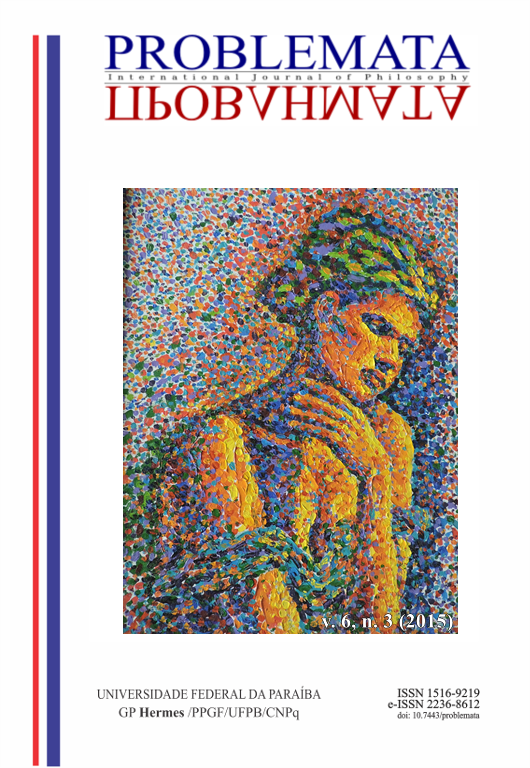A GRAMÁTICA DA MEMÓRIA NA FILOSOFIA DE L. WITTGENSTEIN: ARTICULAÇÕES E DESDOBRAMENTOS
DOI:
https://doi.org/10.7443/problemata.v6i3.17258Keywords:
Filosofia, Psicologia, Mente, Memória, WittgensteinAbstract
Este artigo tem por objetivo apresentar uma investigação acerca do conceito de memória na filosofia de L. Wittgenstein, sobretudo a partir das obras finais em que o filósofo trata de assuntos referentes à psicologia. Uma vez que, através da memória se estabelece o conhecimento do passado no tempo presente, este é um conceito que merece atenção em seu tratamento. O modelo tradicional de memória é o de um sistema de armazenamento em que traços, imagens de vivências são codificadas nesse sistema podendo ser recuperados como lembrança. Nossa pretensão é mostrar as críticas de Wittgenstein sobre essa concepção tradicional de memória, bem como a apresentação de um modo original de tratamento para o conceito. Nesse sentido, propomos a investigação do tratamento dado por Wittgenstein ao conceito de memória, buscando reunir suas observações no estabelecimento do que chamamos de uma “gramática da memória”.
[doi:HTTP://dx.doi.org/10.7443/problemata.v6i3.17258]
Downloads
References
ARISTÓTELES. On Memory and Reminiscence. Translated J. I. Beare. IN: Ross, W. D. (Ed.) (1930). The works of Aristotle - vol. 3. Oxford: Clarendon Press. [A short work, part of the Parva Naturalia, that follows from De anima.]
GLOCK, Hans-Johann. Dicionário Wittgenstein / Hans-Johann Glock. Trad. Helena Martins. Rev.técnica. Luiz Carlos Pereira. Rio de Janeiro: Jorge Zahar Ed., 1998.
LYNCH, Joseph J.. Wittgenstein and Animal Minds. IN: Between the Species. Seattle: April 1996. (pp. 47-52).
MOYAL-SHARROCK, Danièle. Wittgenstein and the Memory Debate. IN: U. Mueller & T. Racine (Eds), New Ideas in Psychology Special Issue: Mind, Meaning and Language: Wittgenstein’s Relevance for Psychology 27(2009). pp.1-26. Disponível em: http://uhra.herts.ac.uk/bitstream/handle/2299/3838/903295.pdf?sequence=1. Acesso em: 02 de novembro de 2013.
PLATÃO. Teeteto (ou do conhecimento). IN: Dialógos I: Teeteto (ou do conhecimento), Sofista (ou do ser), Protágoras (ou sofistas). Trad. Edson Bini. Bauru, SP: 2007. [Clássicos Edipro].
RUSSELL, Bertrand. Analysis of Mind. The Electronic Classics Series Publication, Jim Manis, Editor, PSU-Hazleton, Hazleton, PA 18202, 2001.
SOUZA, Marcus José Alves de. Configurações do Conceito de Vontade na Obra de Wittgenstein / Marcus José Alves de Souza. - - João Pessoa:[s. n.], 2010. [Tese de Doutorado]
STERN, David G.. Models of Memory: Wittgenstein and cognitive science. IN: Philosophical psychology - vol.4, nº2, 1991 (pp.203-218)
VALLE, Bortolo. A Filosofia da Psicologia em Ludwig Wittgenstein: Sobre o “Plano de Tratamento dos Conceitos Psicológicos”. IN: Revista AdVerbum 2 (1) jan a jun de 2007 (pp.102-111).
WITTGENSTEIN, Ludwig. Investigações filosóficas. Trad. José Carlos Bruni. São Paulo: Nova Cultural, 1999. [Col. Os Pensadores].
WITTGENSTEIN, Ludwig. O Livro Azul. Trad. Jorge Mendes. Lisboa: Edições 70, 1992.
WITTGENSTEIN, Ludwig. Observações sobre a Filosofia da Psicologia – vol I e II. Trad. Ricardo Hermann Ploch Machado. São Paulo: Idéias & Letras, 2008. [Subjetividade Contemporânea].
Downloads
Additional Files
Published
Issue
Section
License
Authors who publish with this journal agree to the following terms:
- Authors retain copyright and grant the journal right of first publication with the work simultaneously licensed under a Creative Commons Attribution License that allows others to share the work with an acknowledgement of the work's authorship and initial publication in this journal.
- Authors are able to enter into separate, additional contractual arrangements for the non-exclusive distribution of the journal's published version of the work (e.g., post it to an institutional repository or publish it in a book), with an acknowledgement of its initial publication in this journal.
-
- Authors are permitted and encouraged to post their work online (e.g., in institutional repositories or on their website) prior to and during the submission process, as it can lead to productive exchanges, as well as earlier and greater citation of published work (See The Effect of Open Access).





